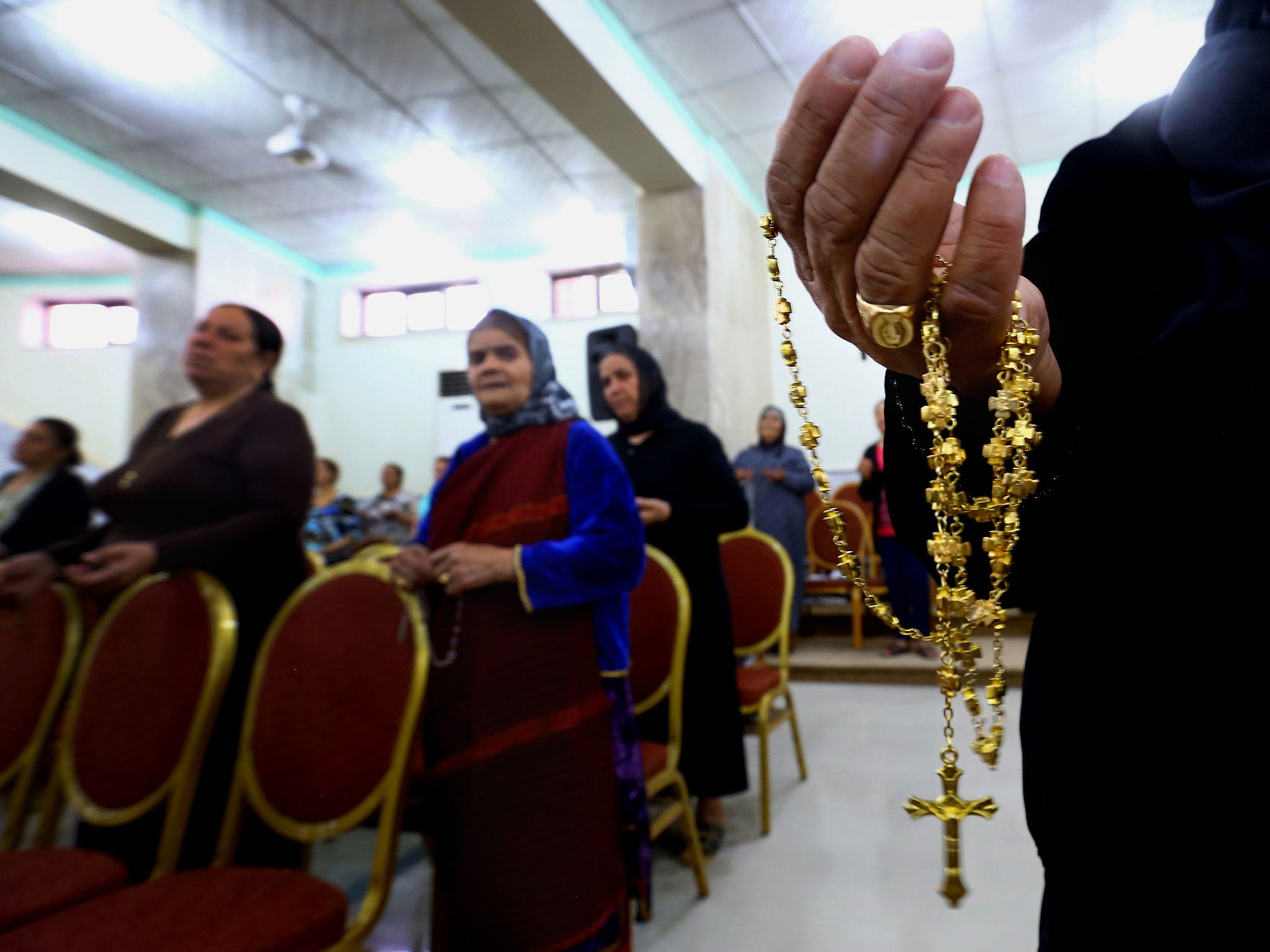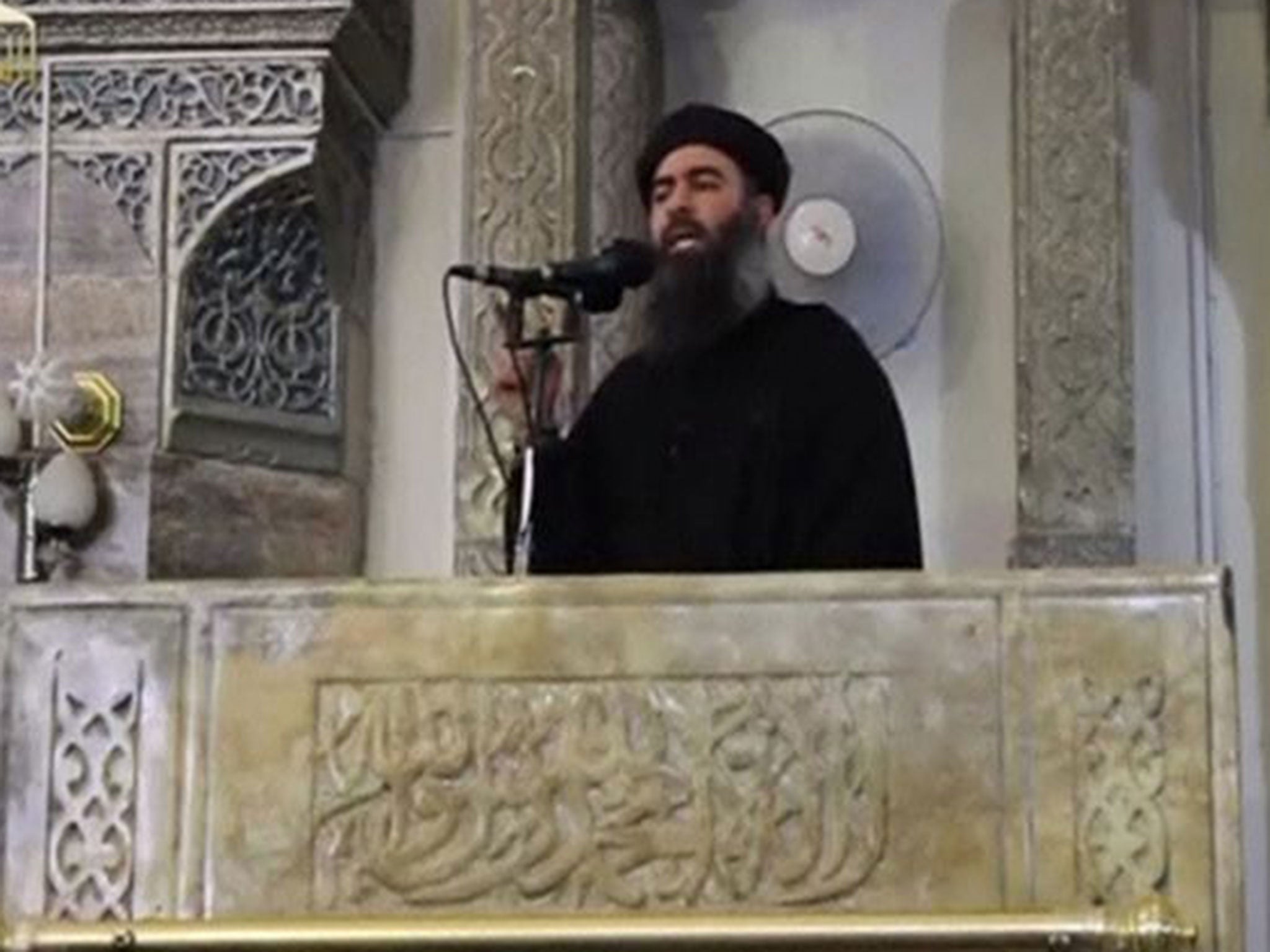Time runs out for Christian Iraq: Isis deadline passes with mass flight
The ultimatum imposed by militants for Christians to convert to Islam, pay a tax or be killed has passed with the collapse of communities that have existed for millennia

The last Christians in northern Iraq are fleeing from places where their communities have lived for almost 2,000 years, as a deadline passed for them to either convert to Islam, pay a special tax or be killed.
The Islamic State of Iraq and the Levant (Isis) issued a decree last week offering Christians the three options accompanied by the ominous threat that, if they did not comply by midday on 19 July, “then there is nothing to give them but the sword”.
It is the greatest mass flight of Christians in the Middle East since the Armenian massacres and the expulsion of Christians from Turkey during and after the First World War. Isis, which now rules an area larger than Great Britain, has already eliminated many of the ancient Christian communities of eastern Syria, where those who had not escaped were given a similar choice between conversion, payment of a special tax or death.
Christians leaving Mosul – which was captured by Isis on 10 June – in order to seek refuge in Iraqi Kurdistan are being stripped of all their possessions.
A Christian man said: “The Islamic State [Isis] stopped my relatives at a checkpoint when they were fleeing and when they found out they were Christians, they took everything they were carrying, including their mobile phones. They left them only with the clothes they were wearing.”
Mosul is one of the most ancient centres of Christianity and on the east bank of the Tigris river that flows through the city is a mosque housing the tomb of the Biblical figure of Jonah. This is now in danger of being destroyed by Isis, whose puritan and iconoclastic version of Islam is opposed to the worship of tombs, shrines, statues and pictures.
Tens of thousands of Shabak and Shia Turkmen, demonised as polytheists and apostates by Isis, have fled their homes following raids by Isis gunmen.
The persecution of Christians, of whom there were over one million in Iraq before the US and British invasion of 2003, was slower to develop.
But a report by Human Rights Watch (HRW) says that from 14 July a number of homes in Mosul were painted with the letter “N” for Nasrani (the Arabic word for Christian). Others were painted with the letter “R” for Rafidah, a word commonly used by Sunni to describe Shia.
Mosul previously had a great diversity of Muslim and Christian communities, all of which are vulnerable. The Christians are mostly Assyrians, known as the Church of the East, or Chaldeans, an Eastern rite of the Catholic Church.
The Yazidis are linked to the Kurds and have a 4,000-year-old religion that centres on the Peacock Angel.
The Shabak, also ethnically connected to the Kurds, are mostly Shia, though some are Sunni, while the Turkmen are majority Sunni with a Shia minority.
Christians were ordered by Isis to attend a meeting with them on 16 July, but they refused to go and a decree was issued the following day offering the three options of conversion, payment of jizia or special tax by non-Muslims or expulsion on pain of death.
The decree had the black logo of Isis and was issued by “Caliph Ibrahim”, who is otherwise known as Abu Bakr al-Baghdadi, the group’s leader. But even before the decree was issued, the report says that money was demanded from Christians: one merchant with a mobile-phone shop was asked to pay between $200 (£117) and $250 a month.
Two Christian nuns and three orphans were kidnapped for 15 days when they stopped at a petrol station. Christian churches in Mosul have been progressively occupied and despoiled.

Chaldean Archbishop Nona told HRW that four cars had come to his archdiocese compound: “Each car carried three gunmen, most of them with masks. They broke open the doors and took some small statues from inside the property and broke them outside. They took control of the premises and placed their black banners on the roof and entrance.
“They told neighbours, ‘this is our property, don’t touch it’.”
Isis’s treatment of the Shia, or any Muslims they do not believe are orthodox Sunni, has been even more brutal than that of the Christians. A statue of the Virgin Mary was destroyed, but so were 13 Shia mosques and shrines. Some 28 Yazidi border guards were held captive for ransom for 25 days, repeatedly beaten with guns and sticks and denounced as “infidels”.
HRW says that “between 13 June and 10 July, Isis rounded up at least 83 Shia Shabak men from villages on the eastern outskirts of Mosul. Seven of the men were later found dead and the rest remain missing”.
Isis raiding parties have been plundering Shia villages, seizing men whose names are on lists, as well as driving off sheep and cattle and telling people to leave.
One man said that Isis told people in one village that the Shia “‘shouldn’t be living here, leave by Friday’. Before they left they tried to make people chant ‘Islamic State! Islamic State’.”
Isis may not be liked by the Sunni population, though there is not much they can do about it for the moment. But there is also deep fear about what government forces would do if they recaptured Mosul.
One woman says that Mosul University has been bombed, adding that she dreads the time when the army of Iraqi Prime Minister Nouri al-Maliki “will reach us in Mosul, killing its people or turning them into refugees”.
The Sunni majority has not been targeted by Isis, whose members, a source living in the city said, are mostly non-Iraqis. He added that people “sense that the locals (Baathists, ex-army and tribes) are biding their time.
“There is no sympathy for Isis. The shops have been told to get rid of ‘unsuitable merchandise’ (eg women’s wear, sportswear, etc) and they are complying’.”
The draconian measures are coming from foreign fighters from Libya, Algeria, Afghanistan, Pakistan, etc. Their language is barely intelligible, so here is no attempt to communicate. Money is very tight, so it seems it is going into buying arms.
Join our commenting forum
Join thought-provoking conversations, follow other Independent readers and see their replies
Comments